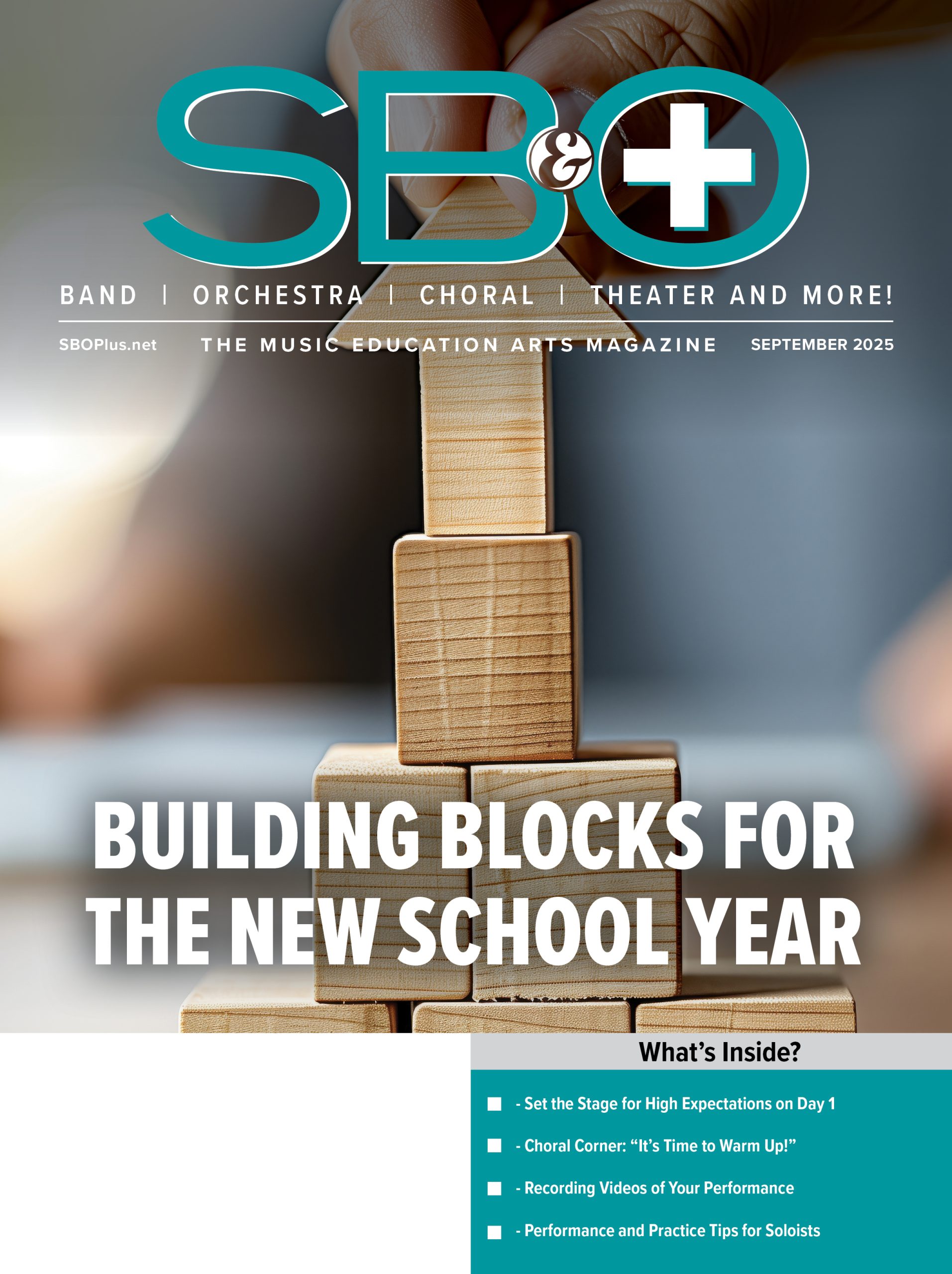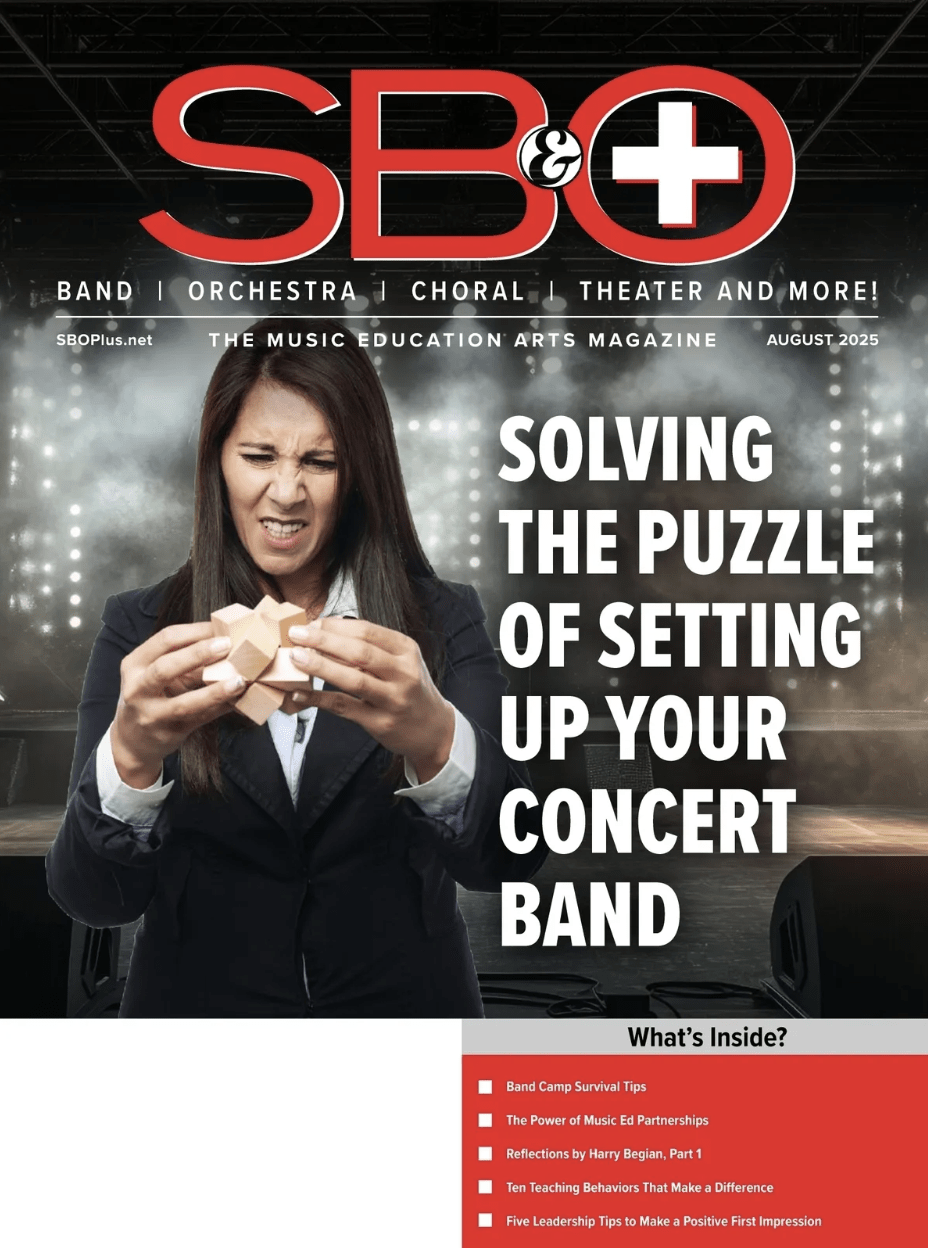Lesson planning can be one of the more tedious responsibilities that we have as conductors and teachers. Among teaching marching band, the creation of handbooks and syllabi, paper work, staff meetings, and simply surviving each school day, lesson planning is often abandoned and we resort to “on the fly” teaching instead.
During a lesson-planning clinic I recently gave in a university student teaching seminar, a student explained that his cooperating teacher “didn’t write lesson plans and felt they were unnecessary.” The student continued, saying, “I don’t believe they are necessary either. I feel like I’m a better teacher when I can teach on the fly and am not bogged down by lesson plans.” Similar to this pre-service teacher, I have gone into a rehearsal and sight-read the music with the band because I thought I did not have time to complete a lesson plan beforehand. Even worse, I convinced myself that I was a strong enough musician to give specific feedback without any preparation. After the student raised this point, I found myself reflecting upon why teachers might feel that planning for a rehearsal is a waste of time. Do we even need lesson plans? Music rehearsals do not always fit the typical template of other non-music courses. It can become very frustrating to write plans that do not always make sense for secondary music rehearsals. After reading this article, I hope that teachers will have a clearer understanding of how lesson plans can help teachers lead a more effective rehearsal.
Before Planning Your Lessons
It seems misguided to discuss lesson preparation without mentioning the importance of selecting good repertoire. This is the first (and perhaps the most important) step to preparing for any lesson. No matter what level you teach, there are composers who write great music for every ensemble. Many state and national music conferences have a “reading band” clinic that usually features grade 1 through grade 5 music. Go to these clinics and take notes for next year’s concerts! If you cannot attend these clinics, or your state does not offer such a clinic, you can find similar information at many websites, including Hal Leonard and J.W. Pepper. Look at the music and grade levels, and listen to the model recording from each site, which can help assist you in picking out quality music that is appropriate for your ensemble.
Another important part of rehearsal preparation is score study, which can take a great deal of time. However, there are ways to reduce the time spent in score study. Having a clear process and system of marking the score will help all conductors be more prepared while on the podium. Therefore, give yourself time to study the score and have a strategy. Preparing a score can be thought of as a three-part system:
• Marking for analysis
• Interpretation
• Marking for rehearsal.
Teachers should score study more frequently and for longer durations before rehearsals so planning for the rehearsal can be more procedural and less about nonspecific feedback.
Developing a Plan
Each teacher’s written lesson plan will look differently. Younger teachers will find that they need to write down more detailed procedures than veterans. Being on the podium and in front of students is more difficult than teachers first imagine and having a thoroughly written out lesson plan can help the novice teacher give more specific and effective feedback. Having already determined the possible solution to a problem can keep you from scrambling to look up fingerings, bowings, or transpositions for each instrument. Similarly, the longer a person teaches, the less they will likely need to write down.
A lesson plan should be thought of as a process. There are many templates to creating a lesson plan that range from writing plans that use meticulous step by step procedures to writing down your plan on sticky notes placed directly on the score. No one way is the correct way. However, no matter what process you decide to use, a successful lesson plan should probably have four main sections: objectives, procedures, assessments, and closure.
Objectives
The first section of a lesson plan should include objectives. Often times, this is what administrators ask to have displayed for your students to see in the classroom. Objectives describe what the class will be doing while demonstrating achievement. When you are creating objectives make sure the following questions are answered:
• What do I want the students to be able to do?
• What are the important conditions or constraints under which I want them to perform?
• How well must students perform for me to be satisfied?
Following the outline written above, it is easy to align your lesson plan with the new National Core Music Standards. You can find the new standards at www.nafme.org/my-classroom/standards. For each standard there are several main sections: Enduring Understanding, Essential Question, Knowledge, Skills, and Vocabulary. First, find the standard that aligns with the goal for the day/unit and look under the Skills section (see Figure 1). Then rewrite the skill to be student-centered and measurable. I like to start each objective with the phrase “Students will…” Examples include: “Students will create 4-bar riffs while the rhythm section plays in various big band leader styles,” “Students will play controlled dynamics, not losing tone quality in loud and soft sections,” and “Students will listen carefully to themselves and how they fit into the overall ensemble sound.”
Procedures
When writing procedures, directors should consider what the ensemble is performing. After you have undertaken extensive score study, you can prepare a long-range plan. In other subjects, this might be called the Unit. For an instrumental rehearsal, the unit often starts with sight-reading and ends with the concert. You now can plan approximate rehearsal segments for each day. This should not be a detailed plan, but rather an overview of the music. I recommend planning by using the musical form of the piece. For a 6-week example, if you have a piece in sonata form, plan for a week each on the introduction, exposition, development, recapitulation, transition, and finally for performing the entire piece. After this, break down each section daily, and decide what music needs to be worked on the most. This plan is simple and will save a great deal of time while rehearsal planning.
The second consideration to writing procedures is determining how the students will accomplish these tasks. Because of your score study and long-term planning, you know the trumpets have a fast eighth-note section in the recapitulation that will need to be rehearsed. How are you going to have the students work on this? What activity will be best? This is also the time to leave the podium to look at students’ fingers and embouchures. Having already determined the possible solution to a problem can keep you from scrambling to look up fingerings, transpositions, or instrument carriage positions.
Assessment
Assessment is done continuously in a music course even when the teacher is not aware of it. This happens in the form of feedback after rehearsing a section, or watching to see if the percussionists are using the correct grip. This is called formative assessment, which is the process of monitoring student learning to provide ongoing feedback. These can be used to improve instructors’ teaching and students’ learning. Feedback should be specific and concise. After working with pre-service teachers on lesson planning and rehearsing, I find they are more successful when they plan feedback ahead of time.
Summative assessment occurs when the goal is to evaluate student learning at the end of an instructional unit by comparing it against some standard or benchmark. I prefer to think of the concert as a great summative wrap-up of what the students have learned throughout the unit. Avoid thinking of this as a one-time test. Students have bad performances from time to time. Instead, think about the long-term growth of the students and how well the students improved from the start of the concert cycle to the end.
Closures
During my first year of teaching, I received high ratings on my lesson plans, content knowledge, and feedback during my classroom teaching from my administrators; however, I also received low scores on my closures, or how well I connected the material of the lesson. I thought, “What’s the big deal? I am doing a good job in every other aspect of my teaching and the students are learning what they need to know!” Students need help processing and making connections. Closure is the time when you finish a lesson plan and help students organize the information meaningfully. As I have matured as a teacher, I have found that my instruction did need the connecting material to help the students retain the information. It is not enough to simply say, “Are there any questions?” in the closure section. If closures are not planned ahead of the rehearsal, it is easy to “lose track” of time and send the students out with little to no connections made. Similar to the conclusion in a 5-paragraph essay, look for a way to add some insight or context to the lesson.
Final Thoughts
Hopefully this article will help teachers understand how lesson plans can help create a more effective rehearsal. Remember, there does not have to be a specific template to create a successful lesson plan.



























